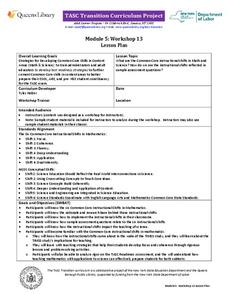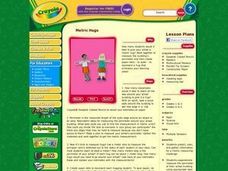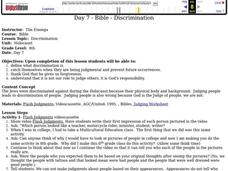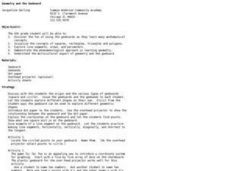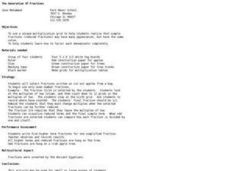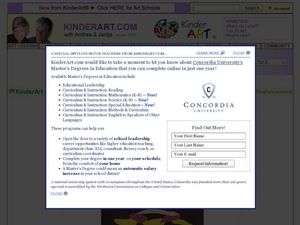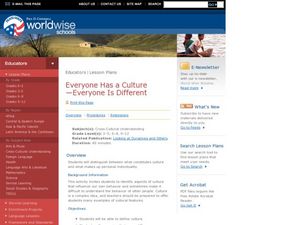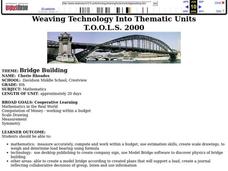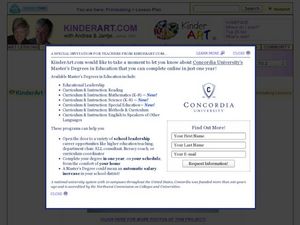Curated OER
Multicultural Math Project
Sixth graders examine where mathematics came from. In this Math History lesson, 6th graders complete various activities to understand mathematical reasoning. Students complete critical thinking questions.
School District of Palm Beach County
Egyptian Hieroglyphs
Humans have been developing number systems for thousands of years, and while they can be very different from one another, they can also share surprising similarities. Take your young mathematicians on a journey through the history...
Curated OER
Measurement and Conversion of Units in a Recipe
In a cross-curricular measurement and literacy instructional activity, your class will identify and compare cooking measurement instruments. They read a recipe and sequence a set of similar instructions in which the steps have been mixed...
Curated OER
Sand Babies
An engaging lesson which has elementary learners measure weight to the nearest pound and construct and interpret a bar graph! They measure length using non-standard units and determine area using square tiles. Pupils round their birth...
New York State Education Department
TASC Transition Curriculum: Workshop 13
The six instructional shifts in this workshop definitely move math and science teachers' understanding of instruction. The workshop, 13th out of a series of 15, asks participants to examine sample tests and to look at how the six...
Curated OER
How Much Has Math Changed?
Learners solve problems using the opposite, reciprocal and powers. In this algebra lesson, students solve problems with inequalities and absolute values. They show understanding of the basic content of math in this lesson.
Curated OER
Metric Hugs
Students predict, plan, and gather information for a metric measuring challenge. They cooperatively measure the perimeter of their school building using appropriate tools according to a plan they devise together. Students create...
August House
Anansi Goes to Lunch - Kindergarten
Greed is the theme of the West African folktale, Anansi Goes to Lunch and this multidisciplinary collection of lessons. First, scholars listen to a read aloud and participate in a grand conversation about the book's key details and...
Curated OER
Locating Points Using Cartesian Coordinates
Students discover coordinates as they explore Chicago. In this math lesson plan, students give the coordinates of a point, plot a point, and use the coordinate system in locating places on a map.
Curated OER
Holiday Market Basket Information
Students practice with calculation of a price index using a fictitious market basket. They apply higher level problem-solving skills and develop an awareness of multicultural holiday rituals.
Curated OER
Making Paper
Students explore paper making. In this cross curriculum multicultural ecology and art instructional activity, students follow written and oral instructions to make paper using common household items. Students predict the amount of paper...
Curated OER
Clowning Around: Drawing
Kids create a clown out of shapes. They work to show emotions while practicing their drawing skills. Pupils use circles, triangles, squares, oil pastels, and their imagination to draw, color, and decorate a sad or happy clown. Tip: Have...
Curated OER
International Festival: France
Students explore French culture. In this cross-curriculum social studies lesson plan, students listen to Madeline by Ludwig Bemelmans and identify words and landmarks associated with France. Students pronounce several phrases in French,...
Curated OER
Discrimination
Seventh graders discuss the origin of discrimination and the Holocaust. In this Bible lesson, 7th graders define discrimination and discuss if they have discriminated or not. They thank God for forgiveness and realize it is no ones role...
Curated OER
Geometry and Geoboard
Sixth graders use geoboards and dot paper to experiment with geometric concepts. In this geometry lesson, 6th graders complete four activities using geoboards or dot paper including naming points on a coordinate plan and finding the area...
Curated OER
The Generation of Fractions
Students explore the process of reducing fractions to simplest form by using a multiples grid. In this simplest form lesson, students pull different fractions out of a bag and then consult their grid to discover all the multiples that...
Curated OER
Hamburger Collage
Students review shapes and their cutting skills by making a hamburger collage. For this shapes lesson plan, students identify shapes that make up the food in a hamburger, cut out the food from construction paper, and create a collage out...
Curated OER
Everyone has a Culture-Everyone is Different
Students explore cultural features. In this multicultural acceptance lesson, students define and discuss "culture," and distinguish the difference between individual characteristics and cultural characteristics. Students...
Curated OER
Money Math
Students investigate the characteristics of the different coins. The teacher presents each coin, and the students identify the distinguishing characteristics of each side of the coin, and the value of each coin. The students complete a...
Curated OER
Physical Differences
Students role play what it would be like to have a physical disability. In this lesson on acceptance, students listen to the book A Rainbow of Friends by P.K. Hallinan. As a class, the students discuss similarities and differences in...
Curated OER
A Method of Front-End Arithmetic
Teach the class how to add using front-end addition. They are given a shopping list and use it to practice adding from the largest place value to the smallest. Computational math and shopping, what fun!
Curated OER
Bridge Building
Eighth graders will create model drawings of bridges and integrate technology into the process of creating a visual representation. Technology is used in the industry of design and architecture. This lesson plan helps to build real life...
Curated OER
Egyptian Hireroglyphs
Fifth graders identify the aspects of Ancient Egyptians and Heiroglyphs. They compare and contrast Egyptian Hieroglyphs with the decimal number system. Students recognize the decimal number system and compares to bases other than ten.
Curated OER
When is a Block, not a Block?
Young scholars use a stamped shape image to create a piece of imaginative art. For this stamped art lesson, students use a stamped shape as a starting point to create their own imaginative piece of art that incorporates the stamped shape.






